May 20, 2020 | By Jake-ann Jones
Tenea D. Johnson
a Multidisciplinary Artist Crafts Blueprints for Better Worlds
. . .
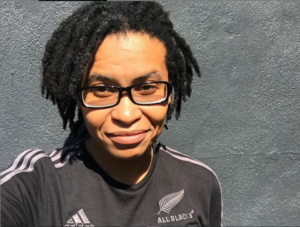
The future is now. Whether you’re a fan of sci-fi and speculative fiction, study quantum physics or biotech, or worry about the grim predictions of conservationists raising the alarms about mankind’s destruction of the planet, Tenea D. Johnson has words for you.
And not only words — Johnson creates musical and visual statements as well. She’s a triple threat — an author, musician, and visual artist — whose razor-sharp vision, attention to tiny details, and love of language and beauty combine exquisitely in her ponderings on how the reality of then, and now, dictates the reality of tomorrow and the future.
Which is to say — she’s a speculative artist comfortable bending and blending methods and genres to best capture what’s currently on her mind and in her soul.
With a new e-book out now, Blueprints for Better Worlds, and the upcoming release of her new collection of short stories, Broken Fevers, due out from Rosarium Publishing this year, Johnson is giving us lots to ponder.
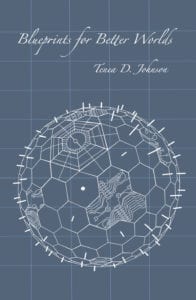
As we stay at home in 2020, living through a very surreal-feeling global pandemic, it was a perfect time to talk to her about “how she got to now.” Born in Louisville, Kentucky, Johnson spent years in New York City, as well as Atlanta and D.C. — but, for now, calls St. Petersburg, Florida, home.
She won the Carl Brandon Society’s 2011 Parallax Award for her novel Smoketown, as well as an Honorable Mention for the same award for her novel-in-stories, R/evolution. Her follow-up, evolution, takes place a century later.
R/evolution explores a world where classism, racism, biotech and disregard for the planet collide. Sounds like now. And that is what the best speculative fiction does. It might feel somewhat futuristic — but it’s also eerily just too familiar. It lets you know, “we’re headed there.”
The novel-in-stories style of the books’ narratives, “better reflects the way my mind works,” Johnson shared in a recent interview.
Her writing also appears in the anthologies Sycorax’s Daughters, a collection of “dark” fiction and poetry by Black women writers, Stories for Chip: A Tribute to Samuel R. Delany, in honor of the legendary gay sci-fi writer and intellectual, and Shades of Blue&Gray: Ghosts of the Civil War, supernatural ghost stories inspired by the American war fought over the repeal of slavery and its inherent social, economic and political fallout.
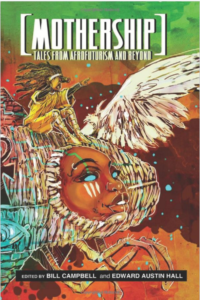
Other anthologies bearing her name include Tangle Girls, in which her story, “Dead and The President” is described as “an apocalyptic future [when] one woman with the power to inhabit many bodies fights to free herself and her people from a heritage of repression.”
Her work is also found in Mothership: Tales from Afrofuturism and Beyond — and yes, Johnson could be called an afrofuturist. Much of the genre’s canon and conversation examines how the future of existence for those of the African diaspora is inextricably linked to our past, as does much of Johnson’s work.
She was also guest editor of the 2013 collection Heiresses of Russ, The Year’s Best Lesbian Speculative, named for outspoken feminist, lesbian science-fiction author Joanna Russ.
While today Johnson is a highly regarded speculative and science fiction author, initially it was her music that garnered attention. She started writing songs and stories at the same time, as a child.
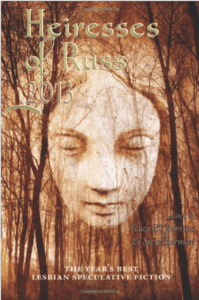
“I don’t think people knew that I wrote science fiction for quite a while. Certainly I started writing stories and songs when I was really young, but people knew about [my music] a bit more than the science fiction.” Johnson surmises this might have been because initially, “I wrote just for me.”
Her friends didn’t even know, she says. Science fiction wasn’t “part of my identity as far as other people were concerned.”
Johnson enjoys bringing storytelling to music because, as she put it, “there are things that can be well articulated with words and there are others other times that words fail. So, I like to fill that gap. I like taking stories off the page.” (Listen to excerpts from “Glider,” one of her “musical stories with composition.”)
So, it’s not only natural for her to present ideas in a multimedia format, but to do otherwise, she says, feels like “an artificial separation.”
While she loves reading for audiences, she admits she actually loves adding music to her performances even more. “Maybe in a perfect world, all of life would be a musical,” she laughs. Her onstage performances include shows at St. Pete’s Studio620, as well as the Knitting Factory, Dixon Place and The Public Theater in New York.
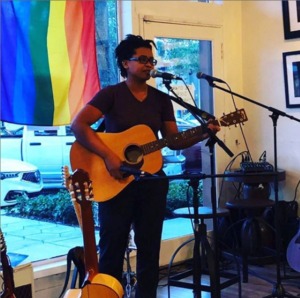
She’s also had the opportunity to flex her visual-art-muscle at the Chad Mize Gallery, where her pieces were seen in the shows “dreams deferred: works inspired by black history,” “Elements,” “Pride and Joy” and “100 Films Part 2.”
Johnson’s identity, like her work, contains traces of her Kentucky upbringing. While she left her hometown state immediately after high school, she’s aware of its influence in her writing.
“I think certain things about Kentucky show up in my work. I don’t place the majority of my stories in Kentucky,” explains Johnson, “But I do feel a sort of responsibility to represent Kentucky in a broader fashion than it’s been represented. Beyond all that, there are some things about it as far as nature goes, that are really gorgeous and have definitely been imprinted in me.” Fireflies, rivers and trees, she says, have given her an “appreciation of Kentucky’s natural beauty.”
When questioned about Kentucky’s reputation as an ultra-racist state, Johnson shares, “It has a very obvious, very ingrained history of segregation — not just racism. ‘Segregation and conflict’ is inherent in the culture, to a certain extent.”

Acknowledging Kentucky’s “brutal kind of slavery” that came with being “gateway to the South” Johnson also muses, “I don’t think it’s something that makes it a place without value.” She maintains that Kentucky — and the entire south — often gets a “bad rap.” According to Johnson, at least, there was never any “subterfuge” about its racism.
“People always let you know what they think, even if what they said was hateful. There’s no denying it.” And, she says chuckling, there are still “people who are completely surprised that there are black people in Kentucky.” She acknowledges the issues were still apparent while she was growing up. Born in the mid-‘70s, when segregation was “no longer the law,” Johnson notes that, although on record things were supposedly better, the reality was something different.
She spent her middle and high school years in advanced classes, because while she was not “disruptive” she was “obviously bored.”
Being in classes where she was often the only black child gave her “a little bit more nuanced” sensibility about how race was playing out around her. “You had people saying things that were really naïve things but also really honest things,” she recalls.
Observing how little intermingling there was between the black students and white students, Johnson found herself as one of the few blacks who were given an insider’s eye on what it meant to have a “crossover” experience.
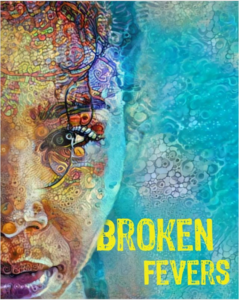
“I think you [get to] see things a little bit different than other people do. In some ways, I could see how I had as much in common with the white kids as I did with the black kids.” This perspective gave her an overview neither of the groups had, because by only seeing their side, “they didn’t see each other clearly.”
In R/evolution, when we meet the character of Ezekiel, he is a boy genius. When asked if the character has some connection to her own experience or is based on her, she chuckles.
“Ezekiel is a genius, so I would love to think I was as intelligent as he is,” she jokes. However, she admits that his experiences somewhat reflected the “liminal place — that gray area” of crossover space that lived during her formative years. “It was such a very particular way to grow up. People have said things to me that I would think you would have more sense than to say — things like ‘you’re not like the other [black kids]… or, ‘you’re trying to be white because you’re in this program.’ Things that are just illogical and reductive,” Johnson sighs.
She says she read “a lot of Octavia Butler” – probably the most well-known, awarded and written about African American sci-fi author — along with Toni Morrison and Alice Walker. She also acknowledges watching “a lot of Star Trek, because my dad watched Star Trek” — and notes that, even now, when people think of science fiction, that kind of “pulpy,” over-drawn, almost melodramatic image of sci-fi comes to mind. Which she admits, can be enjoyable.
But Johnson’s work is not that kind of science fiction. Rather, it is intensely realistic in its depiction of humans caught in terrible situations and draws heavily on themes that are both current and controversial, from reparations to implanted chips… and what feels like a rapidly-approaching “designer baby” culture.
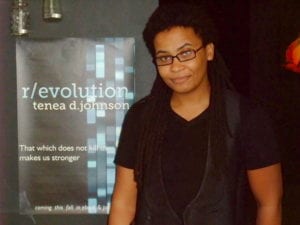
Currently, Johnson’s talent for taking on the challenge of human/life/times has risen to our present occasion: COVID-19, the quarantine period. Her brand new, ‘surprise’ release — Blueprints for Better Worlds — may sound ambitiously optimistic, but stuck inside during this pandemic, it feels more like an antidote to the bad noise circulating around us.
Johnson has summarized her creative production in a blurb: “I draft blueprints for better worlds and tell cautionary tales from those that might yet be, doing my bit to build the world we deserve.”
In the book, the hard-core sensibility of her ‘telling-it-like-it-is-and-we’ll-be-sorry-if-we-don’t-do-something-about-it’ message is pre-empted by a challenge — and an option — to the reader:
. . .
Which world are you living in? Might it be better?
May you make it so.
In the first story of Blueprints, “Beast,” we meet two “wild-headed girls,” Jak and Clem. They fantasize and function behind gas masks, while constructing artificial sunlight and space pods from spare parts in a murky, polluted world. In her speculative way, Johnson is offering her humans of the future ways to make lemonade from lemons.
Her words offer glimmers of resilience and belief in the human mind and spirit. At this point in time, that may be enough to get us through the pandemic and into a new world, a post-COVID-19 world… perhaps, a world that has learned lessons that can only be taught through the hard times Johnson’s stories explore.
. . .
You can learn more about Tenea D. Johnson on her website,
watch videos on her Instagram and check her out on Sound Cloud.
You can purchase her books online at Tombolo Books,
2153 1st Ave S, St. Petersburg, FL 33712.
And check out the latest episode of Keep St Pete Lit‘s Typewriter Talks.


